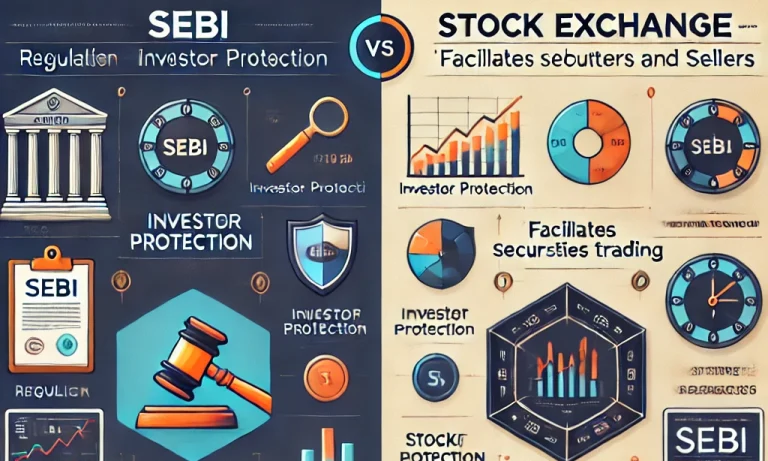The difference between SEBI and the Stock Exchange starts with their very fundamental roles in the overall financial system. SEBI is a governing body representing the regulatory arm of the governance mechanism, responsible for investor protection; it ensures market transparency, operation, and compliance with securities laws. A stock exchange, on the other hand, is a body of trading where securities, such as stocks, bonds, and derivatives, are traded. Together, they constitute the spine of a sound and well-regulated market in finance and each performs a complementary but distinct function.
What is SEBI?
SEBI (Securities and Exchange Board of India) is the regulatory authority established to oversee and regulate the securities market in India. It was formed in 1988 and given statutory powers in 1992 under the SEBI Act. Its primary aim is to protect investor’s interests, ensure fair trade practices, and promote the development of the stock market or securities market.
Key Features of SEBI
SEBI or the Securities and Exchange Board of India, plays a pivotal role in regulating and developing the securities market. Its key features include ensuring compliance, protecting investors, and fostering market growth.
- Regulatory Authority: SEBI ensures that all market participants adhere to the rules and regulations of the securities market.
- Investor Protection: It safeguards investors from malpractices such as insider trading and fraud.
- Market Development: SEBI promotes the development of the market by introducing reforms and new trading mechanisms.
- Statutory Powers: SEBI has the authority to investigate, penalize, and impose sanctions on market participants for violations.
Functions of SEBI
SEBI performs a variety of functions to maintain the integrity and efficiency of the financial market:
- Regulatory Functions: Registers and regulates stockbrokers, sub-brokers, and other market participants. Monitors mergers, acquisitions, and substantial takeovers to ensure compliance with regulations.
- Protective Functions: Prevents unfair trade practices, such as insider trading and price manipulation. Ensures disclosure of essential information by companies for transparency.
- Developmental Functions: Promotes the use of technology in trading, such as online trading platforms. Encourages investor education programs to increase awareness.
- Enforcement Functions: Investigate complaints and take disciplinary action against violators. Enforces penalties, bans, and fines for fraudulent activities.
What is Stock Exchange?
A stock exchange is a structured marketplace where buyers and sellers trade securities such as shares, bonds, and derivatives. It acts as a platform that facilitates the trading of financial instruments while ensuring transparency and efficiency. Examples of major stock exchanges in India include the Bombay Stock Exchange (BSE) and the National Stock Exchange (NSE).
Key Features of Stock Exchange
Stock exchanges are essential components of the financial market, providing a regulated and transparent platform for trading securities, ensuring liquidity, and enabling fair price discovery.
- Marketplace for Securities: It provides a centralized venue for trading financial instruments.
- Liquidity and Price Discovery: Stock exchanges ensure liquidity by allowing investors to buy and sell securities easily while determining market-driven prices.
- Transparency: It ensures that all trades are conducted transparently, with prices and volumes available to all participants.
- Regulated Environment: Stock exchanges operate under strict regulations set by authorities like SEBI to ensure fair trading practices.
Functions of Stock Exchange
Stock exchanges perform critical functions that support the economy and provide benefits to investors and businesses:
- Facilitating Trading: Provides a platform for buying and selling shares, Debentures, and derivatives. Facilitates seamless transactions between buyers and sellers.
- Ensuring Liquidity: Makes it easy for investors to convert securities into cash. Enables businesses to raise capital by issuing shares.
- Price Discovery: Determines the market value of securities based on supply and demand. Provides accurate and transparent pricing information.
- Promoting Investment: Encourages public investment by offering a safe and regulated environment. Increases investor confidence by providing a secure platform for trading.
- Supporting Economic Growth: Helps companies raise funds for expansion and innovation. Contributes to national economic development by channeling savings into productive investments.
Key Differences Between SEBI & Stock Exchange
SEBI and stock exchanges have different roles but work together to maintain the stability and growth of financial markets. Below are five detailed differences:
Role & Function
- SEBI: SEBI (Securities and Exchange Board of India) acts as the regulatory body for the securities market in India. Its primary role is to ensure that the market operates fairly and transparently. SEBI creates and enforces regulations to protect investors, prevent malpractices like insider trading, and maintain trust in the financial system. Additionally, SEBI promotes market development.
- Stock Exchange: A stock exchange is a structured marketplace where financial securities like stocks, bonds, and derivatives are bought and sold. It acts as an intermediary that connects buyers and sellers, facilitating smooth transactions while ensuring transparency. The stock exchange focuses on providing liquidity and helping companies raise funds by listing their securities.
Nature of Authority
- SEBI: SEBI is a statutory regulatory body established by the Government of India under the SEBI Act of 1992. It has the authority to investigate, enforce rules, and take legal action against violators. SEBI’s role is more administrative and judicial, as it ensures that all entities in the securities market operate in compliance with the law.
- Stock Exchange: A stock exchange, like the Bombay Stock Exchange (BSE) or National Stock Exchange (NSE), is an operational entity governed by SEBI’s regulations. While it ensures smooth trading of securities, the exchange does not have enforcement powers over market participants. Its primary authority is limited to its trading systems, ensuring that trades are executed transparently and efficiently.
Focus Area
- SEBI: SEBI’s focus is on regulating the entire securities market, including brokers, listed companies, mutual funds, depositories, and other financial intermediaries. It prioritizes investor protection, market integrity, and creating a level playing field for all participants. SEBI is also responsible for approving the public issuance of shares and ensuring companies comply with disclosure norms.
- Stock Exchange: The focus of a stock exchange is narrower, as it primarily acts as a platform for the trading of securities. It provides the infrastructure for listing securities and ensures fair price discovery based on supply and demand. Stock exchanges also play a vital role in facilitating liquidity, making it easier for investors to buy or sell securities.
Regulatory Oversight
- SEBI: SEBI oversees the functioning of stock exchanges, ensuring that they comply with rules and regulations. It monitors their operations to prevent malpractices such as price manipulation or insider trading. SEBI also audits stock exchanges periodically to verify their adherence to compliance norms and standards.
- Stock Exchange: Stock exchanges operate under SEBI’s regulatory framework, they do not regulate other entities in the securities market. Instead, they focus on maintaining fair and efficient trading systems. They ensure that listed companies and traders follow exchange-specific guidelines, but they cannot penalize violators outside their scope.
Enforcement Powers
- SEBI: SEBI holds significant enforcement powers to investigate violations and impose penalties. It can ban entities from trading, revoke licenses, impose fines, or even recommend criminal proceedings for severe violations. SEBI’s enforcement role extends to individuals, companies, and financial institutions that fail to comply with the law.
- Stock Exchange: A stock exchange has limited enforcement powers. It can only take operational actions, such as halting trading in security due to unusual price movements or suspending trading for companies that fail to comply with its listing requirements. It does not have the authority to impose fines or conduct criminal investigations.
| Aspect | SEBI | Stock Exchange |
| Role & Function | Regulates the securities market, enforces laws, and promotes transparency and investor protection. | Facilitates trading of securities, connects buyers and sellers, and ensures liquidity and transparency. |
| Nature of Authority | Statutory regulatory body under the SEBI Act, 1992, with legal and enforcement powers. | Operational entity governed by SEBI regulations, ensuring smooth trading but without enforcement powers. |
| Focus Area | Broad focus on regulating brokers, companies, and mutual funds, and maintaining market integrity. | Narrow focus on providing a trading platform, fair price discovery, and liquidity for securities. |
| Regulatory Oversight | Oversees stock exchanges, monitors compliance, and audits to prevent malpractices. | Operates under SEBI’s regulations, and enforces exchange-specific rules for trading and listed companies. |
| Enforcement Powers | Can impose fines, revoke licenses, ban entities, and recommend legal action for violations. | Limited to halting or suspending trading; cannot impose fines or conduct legal investigations. |
Conclusion
The key difference between SEBI and Stock Exchange is the role that each plays in the financial ecosystem. There is SEBI, the regulator that ensures transparency, fairness, and consumer protection, whereas stock exchanges provide a platform for trading securities. Both of these organizations are a requirement for the smooth functioning of financial markets – working together for economic growth and stability. Knowing this difference is crucial for investors and businesses to navigate the securities market effectively.
SEBI vs Stock Exchange FAQs
What is SEBI?
SEBI stands for Securities and Exchange Board of India. It is the regulation body in India, that surveys the Indian securities market.
What is a stock exchange?
It is the marketplace that allows trading between securities sellers and buyers like shares and bonds.
Can SEBI regulate stock exchange independently?
SEBI regulates the stock exchange by setting some rules and guidelines to avoid fraud and malpractices.
Can a stock exchange work without SEBI?
No, stock exchanges operate under SEBI’s regulations to maintain transparency and investor protection.
What is the primary difference between SEBI and stock exchange?
SEBI is a regulator with enforcement powers, while stock exchanges are operational platforms for trading securities.


